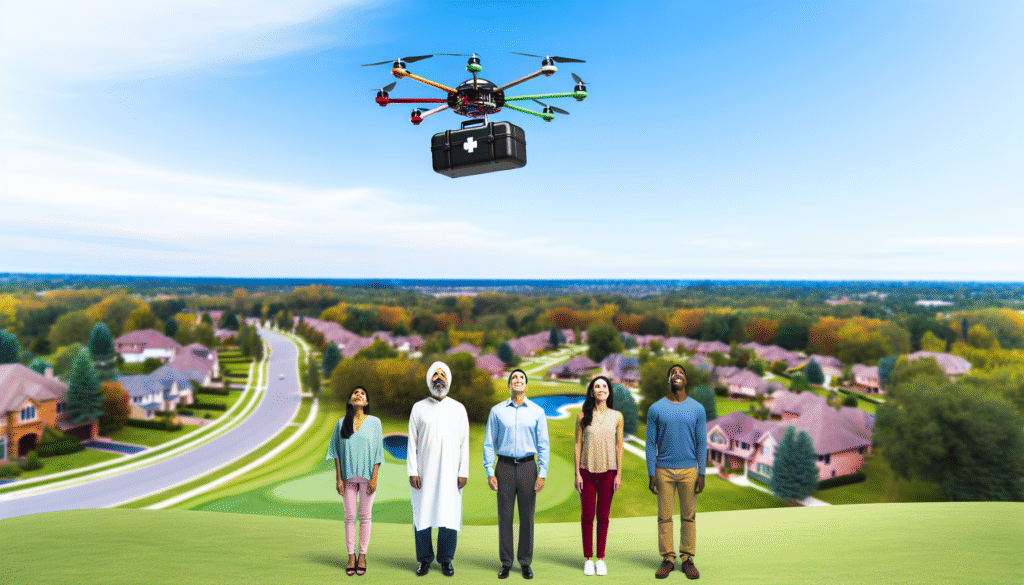The Life-Saving Potential of Drone-Delivered Defibrillators in the NHS
Drones have long been associated with technology and innovation, and now, a groundbreaking study suggests they could play a critical role in emergency healthcare. Researchers from the University of Warwick have explored the possibility of using drones to deliver lifesaving defibrillators to patients experiencing cardiac arrests, particularly in rural areas where ambulances may face delays. This research opens up an exciting new frontier for emergency care, potentially saving lives where time is of the essence.
The Need for Rapid Response
A cardiac arrest occurs when the heart suddenly stops beating, often as a result of a heart attack. In the UK alone, over 30,000 out-of-hospital cardiac arrests occur annually, but survival rates are alarmingly low, with fewer than one in ten individuals surviving. The immediate provision of CPR and defibrillation can double the odds of survival, highlighting the importance of rapid response in these situations. Unfortunately, defibrillators are rarely utilized in time, particularly in remote locations where access is challenging.
Testing the Drone Delivery System
Funded by the National Institute of Health and Care Research (NIHR), the study involved a simulated emergency where a drone delivery system was put to the test. Eleven volunteers were tasked with calling emergency services upon discovering a CPR mannequin, mimicking a cardiac arrest situation. A central control room was then able to dispatch a drone carrying a defibrillator to the scene, showcasing a swift and effective deployment method.
The drone flew directly to the location, hovering nearby before lowering the defibrillator via a winch. This hands-on approach allowed the volunteer to receive the device and instructions for administering CPR, all while staying connected to ambulance service call handlers. Remarkably, the entire process—from the initial 999 call to the delivery of the defibrillator—averaged under ten minutes.
Promising Results and Future Implications
Experts involved in the research have described the findings as “very promising,” with suggestions that the drone delivery system could be operational for real emergencies in the near future. Dr. Christopher Smith, the chief investigator from the University of Warwick, emphasized the potential of this technology, stating, “We’ve built a drone system to deliver defibrillators, which could help save lives.”
Drones are not only capable of flying long distances but can also maintain real-time communication with emergency services during critical situations. The technology aims to enhance the chances of survival for individuals in remote areas, such as farmers or hikers, facing cardiac emergencies.
Collaboration and Next Steps
This innovative research was conducted in partnership with the Welsh Ambulance Service and autonomous drone specialists, SkyBound. Future stages of the project will involve larger studies to evaluate how effectively this technology can be integrated into NHS operations. Other countries, such as Denmark and Sweden, have already experimented with drone delivery of defibrillators, setting a promising precedent.
Government Support for Technological Advances
Stephen Kinnock, a health minister, has expressed his commitment to placing Britain at the forefront of emergency healthcare technology. He noted that drone technology has immense potential for reaching patients faster and particularly benefiting rural communities, demonstrating the government’s support for ongoing research and development in this field.
Real-Life Impact on Cardiac Arrest Outcomes
As highlighted by Professor Mike Lewis, NIHR’s Scientific Director for Innovation, cardiac arrest serves as one of the leading causes of death, necessitating timely interventions. He pointed out the vital role that drones could play in enhancing bystanders’ ability to assist patients before ambulance crews arrive, underscoring the need for innovative solutions in emergency care.
Furthermore, Carl Powell of the Welsh Ambulance Service reiterated the urgency that drones could bring to emergency responses. “In a cardiac arrest, every second counts,” he stated, calling for continuous collaboration among stakeholders to fully explore the potential of this pioneering technology.
By leveraging advancements in technology, the health sector aims to significantly improve immediate care for cardiac arrest victims, ultimately striving for better survival rates and outcomes in emergency situations.

